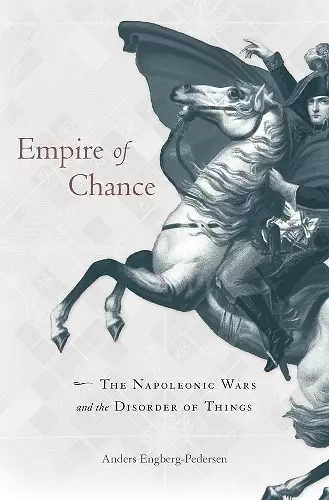Empire of Chance
The Napoleonic Wars and the Disorder of Things
Anders Engberg-Pedersen author
Format:Hardback
Publisher:Harvard University Press
Published:26th Mar '15
Currently unavailable, and unfortunately no date known when it will be back

Napoleon’s campaigns were the most complex military undertakings in history before the nineteenth century. But the defining battles of Austerlitz, Borodino, and Waterloo changed more than the nature of warfare. Concepts of chance, contingency, and probability became permanent fixtures in the West’s understanding of how the world works. Empire of Chance examines anew the place of war in the history of Western thought, showing how the Napoleonic Wars inspired a new discourse on knowledge.
Soldiers returning from the battlefields were forced to reconsider basic questions about what it is possible to know and how decisions are made in a fog of imperfect knowledge. Artists and intellectuals came to see war as embodying modernity itself. The theory of war espoused in Carl von Clausewitz’s classic treatise responded to contemporary developments in mathematics and philosophy, and the tools for solving military problems—maps, games, and simulations—became models for how to manage chance. On the other hand, the realist novels of Balzac, Stendhal, and Tolstoy questioned whether chance and contingency could ever be described or controlled.
As Anders Engberg-Pedersen makes clear, after Napoleon the state of war no longer appeared exceptional but normative. It became a prism that revealed the underlying operative logic determining the way society is ordered and unfolds.
Excellent… Engberg-Pedersen ranges over military theory, literature, philosophy, and cartography, as he traces the conceptual impact of Napoleon’s victories. In each of his discussions, the focus is on how the lived experience of war, and especially defeat, informed received ideas about how to fight… Engberg-Pedersen is a charming analyst of a complex subject. -- Andre van Loon * Weekly Standard *
One of the best books I’ve read in an age… It’s a stunning achievement: beautifully written, meticulously argued, bristling with ideas and substantive insights. -- Derek Gregory * geographicalimaginations.com *
Empire of Chance: The Napoleonic Wars and the Disorder of Things is impressive both in its style and scope and in its penetration of difficult subject matters. The author argues cogently that the Napoleonic Wars motivated a shift in epistemological paradigms. He pays particular attention to the representation of space and parses the theoretical and aesthetic consequences of the transition from siege warfare to mobile armies, from geometry to topography. This is truly a wonderful book. -- Elisabeth Krimmer, University of California, Davis
Engberg-Pedersen’s book can be characterized as an epistemological seismograph, registering, recording, and evaluating the tremors that the Napoleonic warfare sent through many fields of knowledge: military science, literature, philosophy, pedagogy, historiography, and cartography. It detects a radical transformation of the order of things in the period around 1800. But moving beyond Foucault, Engberg-Pedersen argues that this transformation installs not simply history, but chance as the organizing principle of modernity. He substantiates this argument with hitherto little known historical material (e.g. game design and military cartography), as well as with perceptive readings of canonical literary texts ranging from Tristram Shandy to vintage nineteenth-century European novels. All this is done in a style both lucid and elegant. -- Chenxi Tang, University of California, Berkeley
- Nominated for MLA Prize for a First Book 2015
- Nominated for DAAD Book Prize of the German Studies Association 2016
- Nominated for Morris D. Forkosch Book Prize 2016
- Nominated for George L. Mosse Prize 2016
ISBN: 9780674967649
Dimensions: unknown
Weight: unknown
336 pages